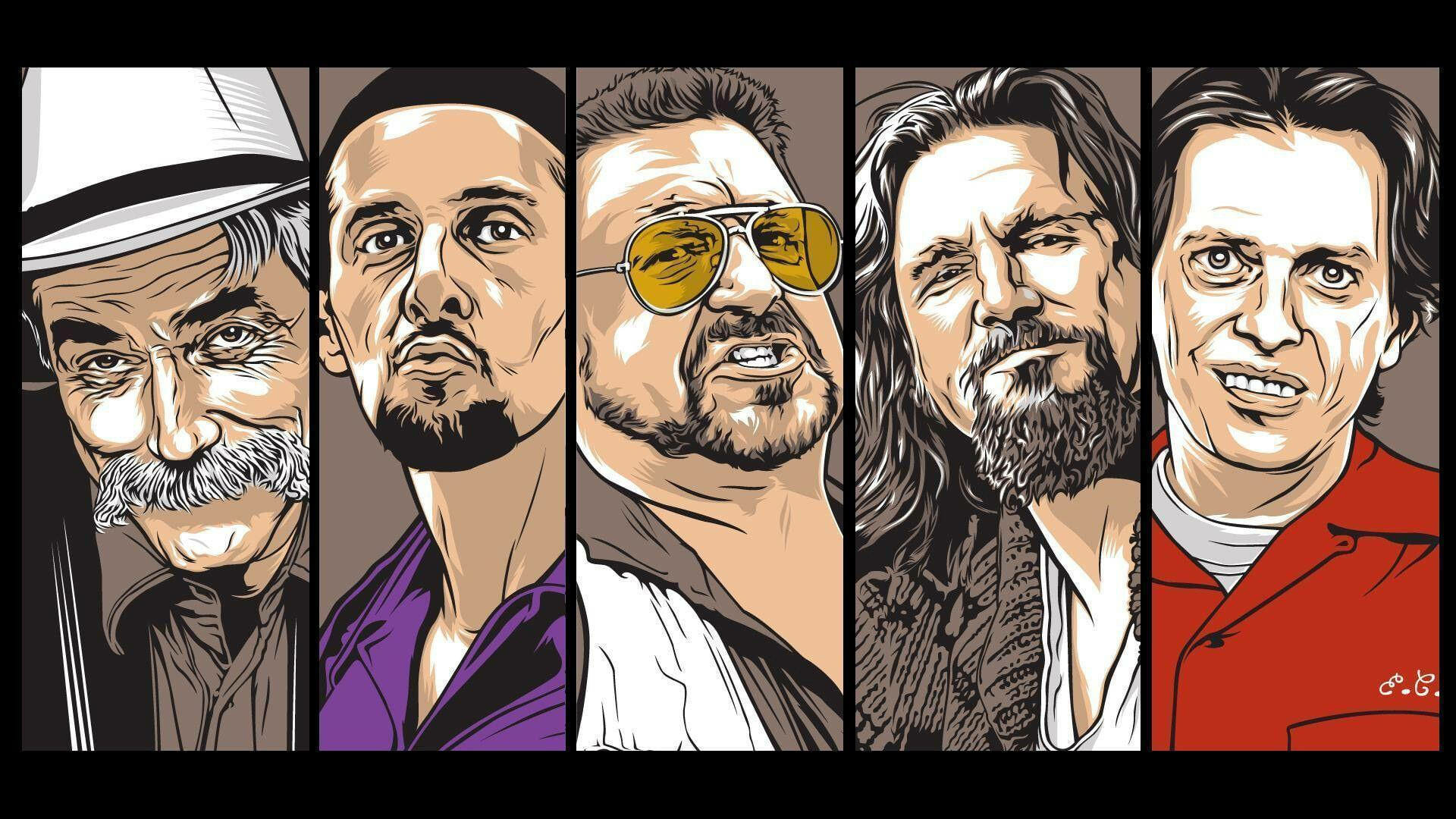
The Big Lebowski | Everyman's Man
Year
Runtime
Main Cast
Cinematographer
Production Designer
Music by
Format
Genre
Just take it easy man!
Jeffrey “The Dude” Lebowski (Jeff Bridges)
In 1998, after the big success of Fargo (1996), directing brothers Joel and Ethan Coen brought to the screen The Big Lebowski, a crime comedy that draws on the noir and Western genres. Despite a lacklustre box office and critical reception, the movie has since become a cult classic.
Much has contributed to making The Big Lebowski a memorable experience. First of all, its iconic, eccentric, and hilarious characters. Just like the protagonist himself played by Jeff Bridges, who in the opening scene breaks the social dress code (and sticks in the viewer’s mind right away) by wearing a nightgown, flip-flops, and Bermuda shorts to buy milk for his White Russian. Or the “strongly vaginal” artist Maude Lebowski (Julianne Moore), who paints naked and tied to a harness. And Jesus Quintana (John Turturro), an eccentric “pederast” who goes bowling in a tight lavender spandex suit. With each song assigned to a specific character, the well-crafted soundtrack will reinforce their identities and characterize them even more.
The life philosophy of its main character, Jeffrey Lebowski, known as “The Dude,” has been so influential that it has led to the creation of a religion, Dudeism, with an official organization, The Church of the Latter-Day Dude, and actual Dudeist priests. In the face of life’s difficulties, the movement basically advocates “taking it easy” and “going with the flow”.
Another element that contributed to the cult status of the movie was the time in which it was produced. At the end of the nineties, the rapidly-expanding use of the Internet made it possible for people who loved the movie to connect and spread their love for it through forums, fan sites, and chat rooms. Not for nothing did The Big Lebowski according to some become the first cult movie of the Internet Era.
For many viewers, the movie was an escape and a response to an interventionist and war-mongering state. In this specific case, the reference was to the Vietnam War and U.S. military interventionism, as well as to a capitalist economy that constrains people in rules and conventionalism.
Beyond this, the movie subverts stereotypes of toxic masculinity through a comic vision. By presenting Lebowski as an unconventional “real man” and mocking the socio-cultural meaning of the word “man” itself.
It all starts with a case of mistaken identity
The early 1990s in Los Angeles. Jeffrey “The Dude” Lebowski (Jeff Bridges) is an unemployed slacker. He spends his time between bowling alleys and drinking gallons of White Russian. He lives his life undisturbed until a group of blackmailers attack him and urinate on his favorite rug due to a case of mistaken identity – a typical narrative trope of the noir genre that the Coens were partly inspired by, claiming to be based on the work of hard-boiled writer Raymond Chandler. After that, the whole movie will be about the Dude’s attempt to be repaid for his rug that “tied the room together”. This is one of the most famous MacGuffins in movie history. The catalyst for the action that will lead him to unwittingly suffer a series of absurd comeuppances.
The Stranger (Sam Elliott) narrates the whole story, a voice-over like in Westerns that becomes an extradiegetic instance in the finale. It shows his approval of the character of the Dude and the story itself and gives the viewer a kind of lesson.
The Dude: an attitude of mind
Movie critic Roger Ebert once wrote, “The Big Lebowski is about an attitude, not a story,” referring to the mindset of Jeffrey Lebowski. Everyone calls him “The Dude” because he refuses to identify himself with a name, a family, a job, or even money. The Dude is an aging hippie. He lives his life with no strings attached. All he cares about is bowling with his friends and coping with life’s difficulties by smoking pot, drinking his favorite cocktail, and taking warm baths. With his shaggy goatee and wardrobe of rummage sale shirts, flip-flops, and bathrobes, he is unconcerned with his appearance or dress code. In the midst of America’s consumer culture, the Dude finds happiness in simple pleasures. This is why he has become one of the most beloved and iconic characters.
The Dude’s life philosophy is encapsulated in his famous mantra: “The Dude abides“. Simply put, it consists in holding on and “taking it easy”. He opposes his values to one of the ruling classes of the capitalist system, represented instead by the avid tycoon Jeffrey “The Big” Lebowski (David Huddleston). In sum, his slacker lifestyle is what makes him “heroic” because it separates him from the greed and power of world capitalist logic.
Creating the Dude
The character of Jeffrey Lebowski, like most of the events and characters in the movie, draws inspiration from real people. The Dude is based on two real-life friends of the Coens: Jeff Dowd and Peter Exline. Dowd is an independent film producer and popular pacifist, called “Dude” by his pals, and a former anti-Vietnam War activist. Exline was a Vietnam vet living in a messy LA apartment. Legend has it that he loved the way his carpet tied the room together.
The rest of the character took his cues from Bridges’ spontaneity. The actor put on weight, wore his old robes, and even dressed as the Dude off-camera.
Countering the Alpha Male
In one scene in the movie, “The Big” Lebowski rhetorically asks the Dude, “What makes a man, Mr. Lebowski? Is it being prepared to do the right thing, whatever the cost? Isn’t that what makes a man?”. The Dude replies: “Hmmm… Sure, that and a pair of testicles.”
With this now-famous response, the Dude subtly demystifies and mocks the model of masculinity embodied by “The Big” Lebowsky. He reduces the definition of masculinity to a biological level. At the same time, he demonstrates his indifference to standardized sociocultural definitions of masculinity.
Actually, the Dude distances himself from other characters who embody such harmful aspects of masculinity. Like his belligerent friend Walter Sobchak (John Goodman), the pornographer Jackie Treehorn (Ben Gazzara), or the aforementioned “The Big” Lebowski. Indeed, the latter embodies an example of a male role model whose bad morals are defined and measured solely by professional success and wealth.
With his Zen philosophy, his aversion to conflict and violence, and, why not, his laziness, the Dude stands as the antithesis of the Alpha Male. He is not belligerent. He is not greedy for profit. And he does not regard the female body as his property. In the end, the Dude is interested in being a human rather than a man.
Between surrealism and epic music
As Roger Ebert noted, “The Coens have always had a remarkable visual style, tending toward overwhelming architectural detail.” They go beyond realism to deliver cinema that is at times surrealist.
The Big Lebowski exhibits the typical Coens style of directing through the bowling alley that represents the center of the movie, the psychedelic and bizarre architecture of the fantasy world. This environment serves as the backdrop for Lebowski’s hallucinatory dream and is also dominated by bright blue and orange colors.
Another hallmark of the Coens’ filmmaking is the importance of the movie’s soundtrack. As critic Sam Kemp observed: “They’ve used music throughout their filmography to heighten the tension, comedic value, and devastating emotional impact of their movies.”
In The Big Lebowski, music is an integral part of the story. It reinforces the character’s identity and key themes of the story. Associate Professor Jeffrey Adams, in his book The Cinema of the Coen Brothers: Hard-Boiled Entertainments, analyzes the movie’s soundtrack (assembled by the Coens with T-Bone Burnett as musical archivist). He finds that it offers a rich variety of musical genres and songs from the 1960s and 1970s. In particular, Adams says that each character has a “musical signature”. The Dude, for example, has many signature songs. The Western music song Tumblin’ Tumbleweed by the Sons of the Pioneers is one of them. The Tumbleweed represents Jeffrey Lebowski “rolling through life carefree”.
Some songs by his favorite band, Creedence Clearwater Revival (CCR), appear in some of the Dude’s scenes. And The Man in Me by Bob Dylan accompanies the Dude’s imaginary flight over Los Angeles on a magic carpet. The song comments on the toxic model of masculinity produced by capitalism of a man who doesn’t need a woman to succeed.
Jeffrey Lebowski has Mozart‘s Requiem in D Minor as his musical signature. It is more suited to the upper class. Jesus Quintana has Hotel California by the Eagles. He is the nemesis of the Dude, who hates the Eagles because they are a bad imitation and revival of the CCR and a “commercial product of a capitalist music industry”. Ultimately, all the songs create a leitmotif for each character that serves as an in-depth study of each one.
The Dude: a massive cult
The Big Lebowski had and still has a strong influence on pop culture, especially in the last twenty years. Not only did it lead to the founding of a religion. It started travelling festivals called Lebowski Fests, which consist of huge gatherings of fans who want to celebrate and remember the movie. It helped revive the popularity of bowling and popularized the Dude’s signature drink, the White Russian. Finally, it also had a major impact on the music industry with its soundtrack, such as indie rockers The White Stripes, but it also had a significant impact on the movie industry by inspiring the genre of “stoner comedies“.
But what made The Big Lebowski a fervent cult? Surely the characters, much indetified with, the characteristic soundtrack, the Internet as a medium for spawning legions of fans, and the highly quotable dialogues that fans learned by heart, thanks to the frequent repetition of the same words. Fun fact: the word ‘dude‘ appears 161 times, ‘f*ck‘ and its variation 292 times. But most of all, the protagonist himself.
Jeffrey Lebowski is an antidote to the small and big problems of everyday life. He accepts life as it comes, and quickly forgets the wrongs he has suffered. He does not feel chained by the need for money and enjoys a simple existence made up of small things.
But the Dude is also an intellectual response to the greed of world leaders, to the selfish values and logic of the ruling classes. He is a peaceful response to any form of violence, especially that of war, to which he responds with his motto, a rallying cry during major conflicts: “The Dude abides!”
Tag
Buy a ☕ for Hypercritic










